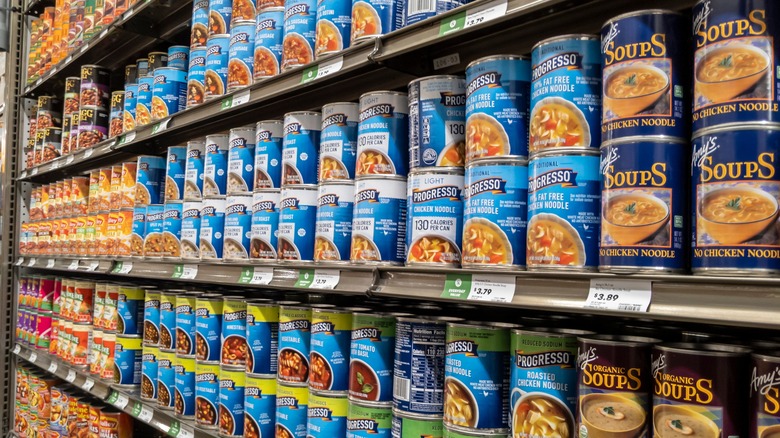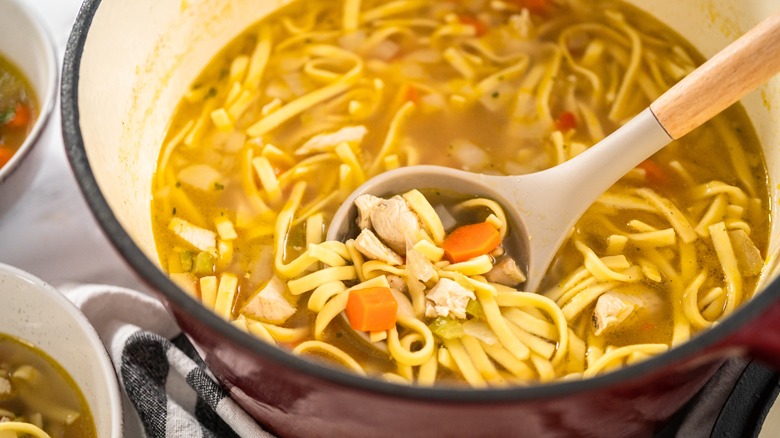Is Store-Bought Chicken Noodle Soup Good For You? What To Consider
If someone offered you chicken noodle soup when you were sick, you'd likely consume the stuff without complaining. Indeed, conventional wisdom tells us to turn to this comforting, tasty, and nutritious broth when we need to bounce back from illness. And its healing properties certainly aren't just an old wives' tale.
Chicken noodle soup, when made right, can offer all the nutrients someone needs to recover from a cold. As explained by clinical nutritionist and certified doctor of natural medicine Josh Axe, chicken noodle soup comes "packed with a range of macro and micronutrients, including protein, fiber, B vitamins, vitamin C, amino acids, and more" (via Insider).
There's probably no question in your mind as to why you should eat chicken noodle soup when you're feeling sick. However, you might be wondering if this means you have to force yourself out of bed and prepare it from scratch, or if the store-bought varieties would suffice. According to health experts, there are a few factors to consider.
Reading the label should give you some insight
The main reason why chicken soup helps you recover from illness is because of the nutrients it contains. When you make the stuff at home, you get to control the ingredients you throw in, while also keeping a handle on the quality. You can moderate salt content, decide which vegetables you want to add, use free-range chicken, and even replace regular white noodles with the healthier whole-grain kind.
A can of store-bought chicken noodle soup doesn't offer that flexibility, so you have to start by carefully reading the ingredient list and understanding what's in it. Things to keep in mind include sodium content, preservatives, and just how much protein you're getting per can. Registered dietitian Danielle Frost told HuffPost that when it comes to protein, you want to look for a soup that has at least 10 grams per container. With sodium, be mindful of your recommended daily intake – no more than 2,300 milligrams and ideally 1,500 milligrams a day – as anything over 300 milligrams of sodium per serving isn't ideal.
Chicago-based registered dietitian Luis Gonzalez told HuffPost that since nutrition facts are listed based on serving size, it's important to remember that for most canned varieties, one serving is equivalent to just half the can. He also advises adding more water to the soup if a serving isn't enough, which has the added benefit of diluting its sodium content.
If the ingredient list is confusing you, you may want to skip the product
So, what's the best option for store-bought chicken noodle soups? Three health professionals interviewed by HuffPost ranked Health Valley's chicken noodle soup as one of the best out there. Aside from its low sodium content, it has 5 grams of protein per serving. Plus, the organic (and recognizable) ingredients give it an edge.
With that said, if the idea of store-bought soup somehow still makes you feel concerned, your feelings are valid, according to health experts. If the ingredient list seems difficult to comprehend and you're having trouble deciding which brand of chicken noodle soup to buy, you might be better off just purchasing organic broth and making the soup yourself. After all, there really is nothing that beats making the stuff at home. Here's a simple and nutritious chicken noodle soup recipe you can follow when you're craving this classic comfort food (and it will only take 20 minutes to prepare).


